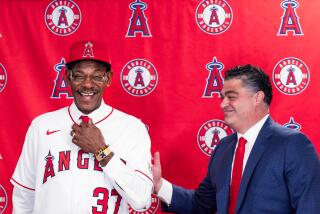GASTON’S BASTION : Blue Jays and Their Popular Manager Back in Friendly SkyDome
- Share via
TORONTO — The Toronto Blue Jays, down, 0-2, to the Oakland Athletics in the best-of-seven American League playoffs, return to the protective cover of their SkyDome tonight, where one thing seems certain:
A sellout crowd, the 36th in a row here, will raise its voice before Blue Jay Manager Cito Gaston does.
Not even the base-running antics of Rickey Henderson or the precarious status of Gaston’s team are likely to shake his restraint and composure.
In the pack journalism of the postseason, only those reporters within a foot or two of the soft-spoken Gaston can hear his brief comments.
Of his style, Gaston says, “I like to contain myself. I don’t let little things bother me. I believe in thinking something through, rather than reacting without thought.”
Said Toronto General Manager Pat Gillick: “Cito isn’t a disciplinarian. He builds his relationships on a one-on-one basis. They tend to be deeper and more meaningful because of it. There’s a mutual respect between the players and manager.”
A man to whom relationships--in both the home and the clubhouse--are obviously important, Gaston was reluctant to take the Blue Jays’ reins and may have to be talked into remaining as manager--if talk alone can do it.
He replaced the fired Jimy Williams as interim manager on May 15 and became the permanent choice May 31, after the Blue Jays were unable to shake Lou Piniella free from his contract with the New York Yankees.
It is said in baseball that some of the best trades are those that aren’t made, and that’s the way the Blue Jays reflect on their inability to get Piniella.
Gaston’s calm brought balm to a team often in turmoil under Williams. The Blue Jays went 77-49 after May 15, the best record in baseball. The mental and fundamental breakdowns that have haunted a talented team continue, but the fractious environment of previous years seems to have been eradicated.
“He gave us peace,” pitcher Mike Flanagan said.
Management’s appreciation was illustrated at a recent meeting of baseball owners when club president Paul Beeston, with tongue in cheek, approached Yankee owner George Steinbrenner and presented him with a list of Toronto players.
“You can pick any four,” Beeston said.
“What do you want in return?” Steinbrenner asked.
“Nothing,” Beeston said. “It’s our way of thanking you for not letting Piniella out of his contract.”
” . . . you,” Steinbrenner said and stormed away, missing the humor in it.
The Blue Jays, of course, weren’t laughing when they got off to a 12-24 start, prompting the firing of former third base coach Williams, who succeeded Bobby Cox as manager in 1986.
“Jimy had reached the point where he was frustrated with the team’s performance and he transferred that frustration to the players,” Gillick said. “Jimy had done a good job for three years, but he felt this was his last hurrah, and the players sensed that pressure and questioned his decisions.
“Cito (Toronto’s batting coach for the previous seven seasons) took over and lifted the tension. The players relaxed. They weren’t afraid to make mistakes.
“We have a lot of talent on this team, but these guys have to feel they can express that talent. Cito gives them the room to do that.
“I mean, we made some important moves during the season, bringing up Junior Felix and Goose Gozzo and making the deals for Jim Acker, Mookie Wilson and Lee Mazzilli, but appointing Cito turned out to the most important. He got us going and kept it on an even keel.”
How did he do it?
Gaston laughed and shook his head.
“If you find the answer, let me know,” he said. “I didn’t get any hits or make any pitches. The players did it, and my ego isn’t so large that I would suggest otherwise.
“I mean, I came out of spring training thinking this team could win and I still believed it when I took over. Maybe that confidence rubbed off.”
There was more to it, the players believe. They say Gaston improved communications, restored the starting pitchers’ confidence by staying with them longer and defined the relievers’ roles.
Catcher Ernie Whitt, the only Blue Jay remaining from the 1975 expansion draft, said there was a release of tension when Williams was fired and that Gaston came in with a bond of respect he had developed as batting coach.
Whitt said: “Mind you, when a coach becomes manager as Cito did, he often puts up a wall between himself and the players, but that hasn’t happened, and Cito has said he wants us to tell him if if does.”
Gaston said he has simply tried to remember the things that were important to him when he was playing. Honesty. Communication. One-on-one respect. His door is always open, he said.
“I don’t believe in team meetings because players hate them and, after a while, stop listening,” he said.
“In my case, I went from prospect to starter to an extra man and pinch-hitter. The toughest thing is for the guys who aren’t playing regularly to stay ready and feel a part of it, so I’ve tried to give them as much playing time as possible. I don’t walk by them, pretending I don’t see them.”
Said Buzzie Bavasi, the former Angel and Dodger executive who was president of the San Diego Padres during Gaston’s six years as a player there:
“Cito has a lot of Walter Alston in him. He’s quiet but forceful. I called him when he got the Toronto job and said, ‘Don’t try to be John McGraw or anyone else. Be yourself.’ And I think he has.”
Gaston’s approach has defused the time bomb known as George Bell. Under Williams, Bell complained of a lack of respect and communication and railed against his employment as a designated hitter. Under Gaston, the enthusiastic Bell responded with an MVP-type season.
“Cito talks to me, he explains things,” Bell said. “He doesn’t scream at you in the dugout or clubhouse. He doesn’t embarrass you in front of your teammates.
“Cito treats you like a part of the family,” Bell said. “He knows how to deal with people.”
Always has, it seems.
Bobby Cox, general manager of the Atlanta Braves, remembers the spring of 1979 when he was managing the Braves and chose to keep Charlie Spikes rather than Gaston.
“I’m sure Cito felt I should have cut Spikes instead, but he never said anything,” Cox said. “He took it like a pro.
“That stayed with me, and when Cito came back after playing another couple years in Mexico, I hired him as a minor league hitting instructor, then took him to Toronto (when Cox became the Blue Jays’ manager in 1982) as my batting coach.”
Al LaMacchia, then a scout with the Milwaukee Braves and now a Toronto vice president, remembers signing Gaston in 1964.
He was 20, two years out of high school, living in San Antonio, driving a garbage truck during the week, playing softball at night and baseball with the Cardona Welders in a city amateur league on Sundays, wearing borrowed spikes.
LaMacchia had never seen nor heard of Clarence Edwin Gaston, nicknamed Cito because of his boyhood affection for a Mexican wrestler named Papacito, until the day he signed him.
“I was supposed to be across town, watching another kid play, but the weather was bad and I didn’t want to make a wasted trip,” LaMacchia said.
“So I drove to a park that was about six blocks from my house, sat in the car and watched this tall center fielder, who ran to first base in about 4.2 seconds and seemed to have good power, open my eyes.”
By the time that day was over, LaMacchia convinced Gaston’s mother that he should sign with the Braves, though he was also being romanced by the Houston Astros. His only bonus: the promise of an off-season job.
“Cito has never once said that he didn’t get enough,” LaMacchia said. “He’s always told me that he was grateful for the chance I gave him. I mean, that’s that kind of kid he is.”
Gaston spent parts of 11 seasons in the majors, never coming back to his 29 homers and 93 runs batted in of 1970, when he was an All-Star with the Padres. He is 45 and no longer a kid, but the man and his reputation haven’t changed.
Private. Selfless. Devoid of rampant ego. Refusing now--despite his position as baseball’s fourth black manager and the first to manage in the postseason--to seize the national spotlight and push the issue of minority hiring.
“My name wasn’t mentioned much as a managerial candidate until Al Campanis appeared on ‘Nightline’ (and talked about blacks possibly lacking the necessities to manage in the majors),” Gaston said. “I felt I would manage in time, but I saw no reason to push it. I would never take a job just because of ego or money.”
And when Williams was fired and Gaston became interim manager, he announced that he wasn’t a candidate for the permanent position and, in fact, urged the Blue Jays to make it a short search.
“I didn’t want people to change their perception of me, as they did Jimy once he started filling out the lineup and making pitching changes,” Gaston said. “Also, there are more demands on your time as a manager and I didn’t know whether I wanted to give up what free time I had.”
Gaston is married, for a second time. His wife, Denise, has two children from a previous marriage, as does Gaston.
“I didn’t see either of my daughters grow up because I was off playing ball and that’s something I’ll always regret,” he said.
“I didn’t want to make that mistake a second time and I still don’t.”
When the bid for Piniella failed and the Blue Jays turned to Gaston, however, he said he decided to become more than an interim manager because of the support of the players, figuring that on that basis he could make a managerial contribution.
Now, with his wife having been ill recently, some of the old doubts about privacy, time and people’s perceptions have crept in again.
“I won’t decide about next year until this year is over,” he said in that soft voice, aware that it could be over by the end of the weekend.
More to Read
Go beyond the scoreboard
Get the latest on L.A.'s teams in the daily Sports Report newsletter.
You may occasionally receive promotional content from the Los Angeles Times.










